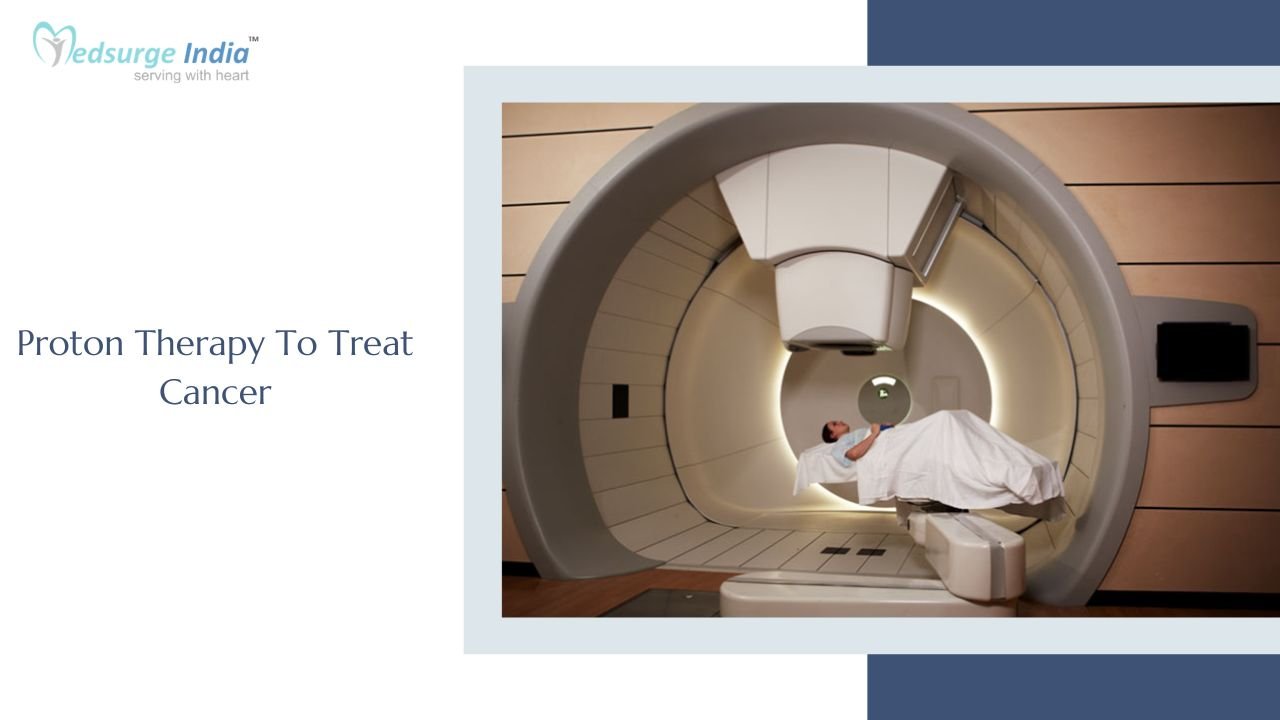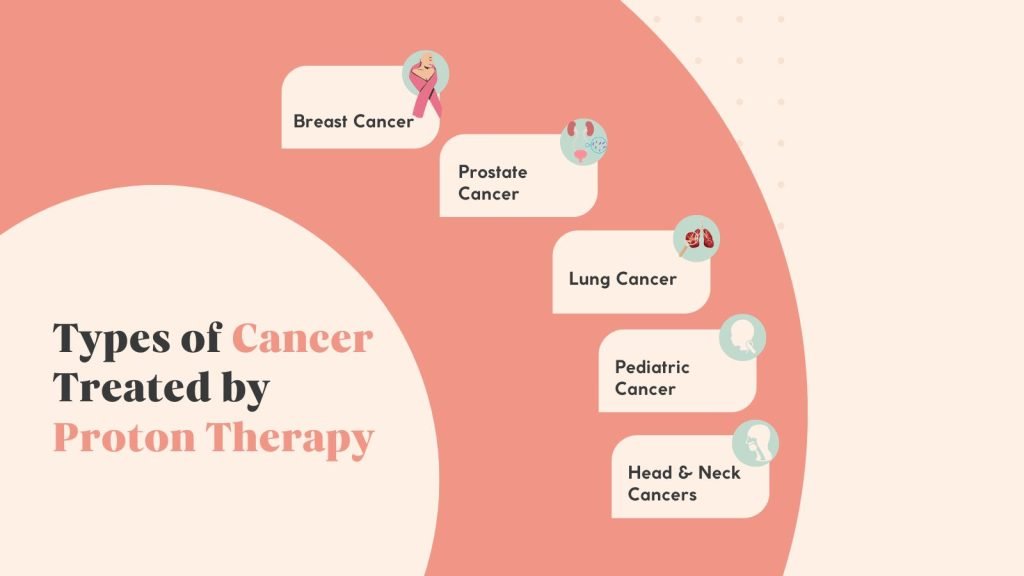
Throughout the world, millions of people are impacted by the disease known as cancer. Radiation therapy, chemotherapy, and other conventional cancer therapies have advanced significantly in recent years. However, the development of proton therapy has transformed the way cancer is treated by providing a precise and efficient substitute.
Proton therapy is a cutting-edge radiation treatment that has revolutionized cancer care. By leveraging the unique properties of protons, this advanced therapy offers precise tumor targeting while minimizing damage to surrounding healthy tissues. This blog will discuss proton therapy for cancer and how it is applied to the treatment of various cancers.
What Is Proton Therapy
Proton therapy is a form of radiation therapy that utilizes protons, which are charged particles found in the nucleus of atoms. Unlike traditional radiation therapy, which uses X-rays, proton therapy delivers high doses of radiation directly to cancer cells while minimizing damage to surrounding healthy tissues. This precision is achieved by controlling the depth at which the proton beams release their energy, allowing doctors to target tumors with remarkable accuracy.
Types of Cancer Treated by Proton Therapy
Proton therapy has shown promising results in the treatment of various cancers, including:
- Breast Cancer: Breast cancer is the most common cancer among women worldwide. Proton therapy has emerged as a valuable treatment option for breast cancer patients, particularly those with left-sided tumors. By sparing the heart and lungs from unnecessary radiation exposure, proton therapy minimizes the risk of long-term side effects and enhances the overall quality of life for patients.
- Prostate Cancer: Prostate cancer affects millions of men globally. Proton therapy has gained significant prominence in the treatment of prostate tumors due to its remarkable precision. By precisely targeting the cancerous cells, proton therapy delivers high doses of radiation to the tumor while sparing nearby critical structures such as the bladder and rectum. This approach results in reduced side effects and improved long-term outcomes for patients.
- Lung Cancer: Lung cancer is a complex disease that requires a comprehensive treatment approach. Proton therapy has emerged as a viable alternative for lung cancer patients, particularly those with early-stage tumors or those unable to undergo surgery. By precisely delivering radiation to the tumor while sparing healthy lung tissue, proton therapy offers a promising treatment option that can effectively control cancer growth.
- Pediatric Cancers: Children diagnosed with cancer require specialized care that takes into account their growing bodies. Proton therapy has revolutionized the treatment of pediatric cancers by minimizing radiation exposure to developing organs and tissues. This targeted approach reduces the risk of long-term side effects such as secondary cancers or growth abnormalities, offering hope for improved outcomes and a higher quality of life for young patients.
- Head and Neck Cancers: Head and neck cancers, including tumors in the nasopharynx, sinuses, and salivary glands, can be challenging to treat due to their proximity to critical structures. Proton therapy offers precise radiation delivery, minimizing damage to nearby organs such as the brainstem, optic nerves, and spinal cord. By reducing the risk of debilitating side effects such as hearing loss, swallowing difficulties, and cognitive impairment, proton therapy provides a valuable treatment option for patients with head and neck cancers.

Advantages of Proton Therapy
1.Reduced Side Effects: One of the main advantages of proton therapy is its ability to spare healthy tissues from unnecessary radiation exposure. This significantly reduces the risk of long-term side effects, such as damage to organs and surrounding tissues.
2.Enhanced Treatment for Pediatric Patients: Proton therapy is particularly beneficial for treating cancer in children. Since children are more sensitive to radiation, proton therapy’s targeted approach minimizes the risk of developmental issues and secondary cancers later in life.
3.Treatment for Deep-Seated Tumors: Proton therapy is ideal for treating tumors located deep within the body, where traditional radiation therapy may be less effective. By precisely delivering radiation to these hard-to-reach tumors, proton therapy offers new hope for patients who were previously deemed inoperable.
4.Precise Targeting: One of the primary advantages of proton therapy is its ability to precisely target tumors while minimizing damage to surrounding healthy tissues. Protons have a unique physical property known as the Bragg peak, which allows them to deposit most of their energy at a specific depth within the tumor. This precision helps to reduce the risk of side effects and improve treatment outcomes.
5.Treatment for Complex Tumors: Proton therapy is effective in treating complex tumors that are located near vital structures or have previously received radiation. Its precision and ability to target hard-to-reach tumors make it a valuable treatment option for patients who may have limited alternatives.
Facts of Proton Bean Therapy
Proton therapy, a form of radiation therapy, has emerged as a promising treatment option for cancer patients. By utilizing protons to target tumors, this advanced technique offers several advantages over traditional radiation therapy. However, like any medical treatment, proton therapy also comes with its own set of facts.
1.Limited Availability: Proton therapy requires advanced infrastructure, including specialized proton therapy centers. Currently, these facilities are limited in number, making proton therapy less accessible to patients in certain regions. The limited availability may result in longer waiting times or the need to travel long distances for treatment.
2.Higher Treatment Costs: Compared to conventional radiation therapy, proton therapy can be more expensive due to the substantial initial investment required to build and maintain proton therapy centers. Additionally, the complex nature of proton therapy treatments, including the need for customized treatment plans, can contribute to higher treatment costs.
3.Lack of Long-Term Data: Proton therapy is a relatively new treatment modality, and as a result, there is limited long-term data available on its effectiveness compared to traditional radiation therapy. While early studies have shown promising outcomes, further research is needed to fully understand its long-term benefits and potential side effects.
Proton therapy offers significant advantages in terms of precise tumor targeting, the reduced radiation dose to healthy tissues, and improved treatment outcomes, particularly for pediatric patients and complex tumors. However, the limited availability, higher treatment costs, and the need for more long-term data are important factors to consider. As technology advances and research continues, proton therapy has the potential to revolutionize cancer treatment, providing patients with a more precise and targeted approach to fighting this disease. Additionally, treatment for cancer in India is on par when compared with other developed countries.
Side Effects of Proton Bean Therapy
As cancer cells are destroyed by proton therapy or when the energy from the proton beam affects healthy tissue close to the tumor, adverse effects may occur. Proton treatment is thought to have fewer side effects than conventional radiation therapy because doctors can more precisely control where the maximum concentration of energy is released. However, healthy tissue does get some of the energy from proton treatment.
Depending on where the area of your body is being treated and the proton therapy dose you receive, you may encounter adverse effects.
- Hair loss in the vicinity of the treated area of your body
- Redness of the skin in the vicinity of the treated area of your body
- Aches and pains around the area of your body that is being treated
- Fatigue
Conclusion
Proton therapy has revolutionized the field of radiation oncology, offering an innovative approach to cancer treatment. By precisely targeting tumors while minimizing damage to healthy tissues, this advanced therapy has proven to be effective in treating various types of cancer. From breast cancer to pediatric cancers, proton therapy offers hope for improved outcomes, reduced side effects, and an enhanced quality of life for patients. As research and technology continue to advance, the scope of cancers treated by proton therapy is likely to expand further, paving the way for a brighter future in cancer care.
Reference
- https://www.cancer.net/navigating-cancer-care/how-cancer-treated/radiation-therapy/proton-therapy
- https://www.mayoclinic.org/tests-procedures/proton-therapy/about/pac-20384758
- https://www.hopkinsmedicine.org/health/treatment-tests-and-therapies/proton-therapy
- https://my.clevelandclinic.org/health/treatments/17882-proton-therapy



 (1).png)